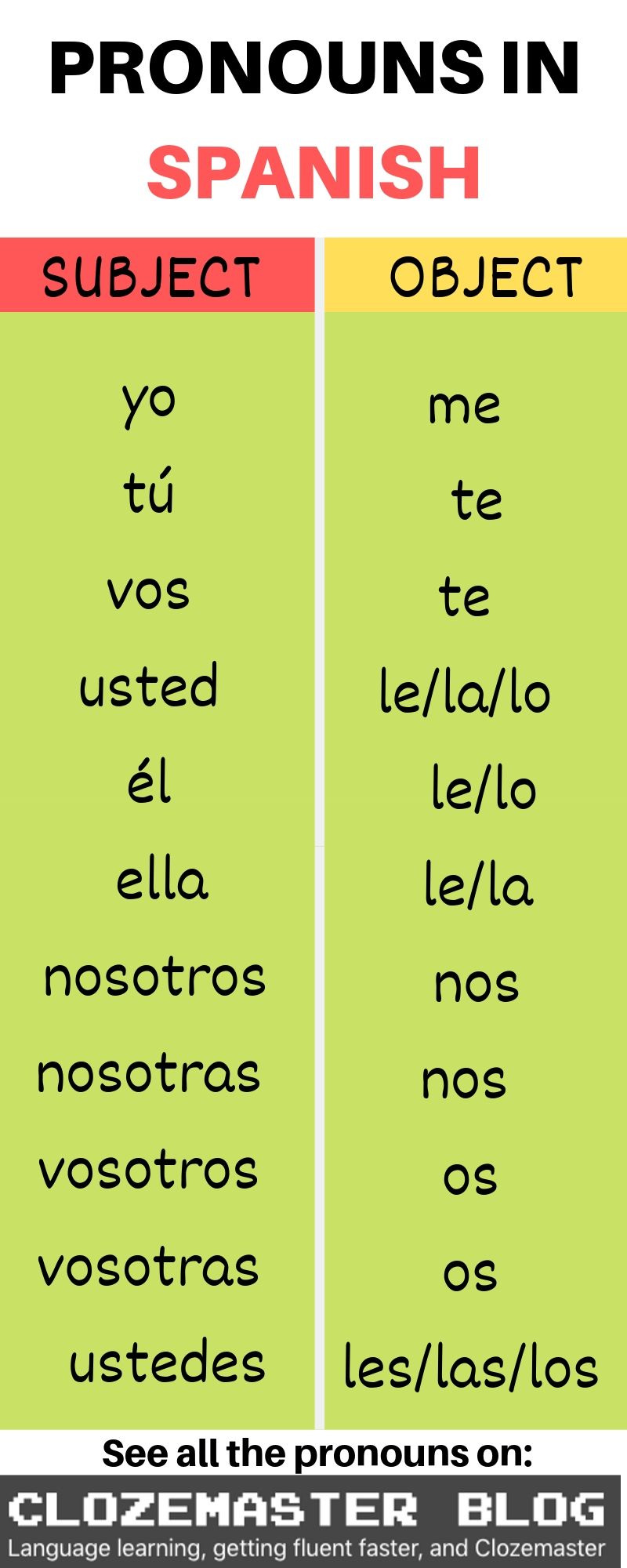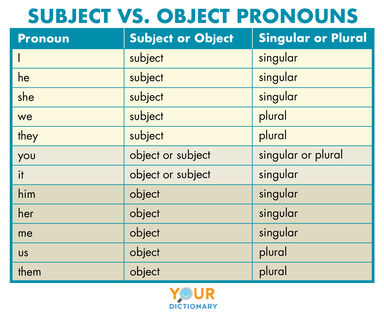Pronouns include subject pronouns object pronouns and possessive pronouns. They come from London.
In this video I have explained the difference between Subject Pronouns and Object PronounsWhat are subject pronounsWhat are the object pronounsFind out h.

Object pronouns vs.subject pronouns. Object after the verb Object pronouns are the object of a verb. Note that the pronouns it and you have the same form in the nominative and the objective case. Subject pronouns replace the subject nouns in a sentence.
This a list of all of the pronouns in the English Language. My Mine Our Ours Second Person. If playback doesnt begin.
They go before the verb. Notice that it and you are the same when theyre subject pronouns or object pronouns We use the object pronouns in most situations when the pronoun is not the subject of a verb. Object Pronouns In English we also have object pronouns.
Subject Pronouns Object Pronouns Determiners Possessives Ref. Me you him her it us them. Subject pronouns go before the verb and object pronouns after verb or preposition.
What then is the difference between subject and object pronouns. To check for correct case you should be able to replace me with any other object pronoun and have a clear sentence. These are used to replace nouns in sentences.
The correct sentence should have me the object pronoun following the verb. They go after the verb. Complete the following sentences using an appropriate pronoun.
It is also important to learn possessive adjectives when learning these forms. Use the chart below and then study the example sentences chart. Object forms objective case are used when the pronoun is the object of the verb.
Personal pronouns and the object forms me you him her us them - English Grammar Exercises Online. Finally you can practice what youve learned by taking the quizzes below. They directly or indirectly receive the action or preposition in a sentence.
Here is a brief way to say all this information about subject and object pronouns. Your Yours Your Yours Third Person. They indicate who or what the sentence is about.
We use them for the object of a verb. Your choices are I you he she it who we they. Let us have a closer look at the difference.
Practise using the English subject and object pronouns with this free online exercise. Subject before the verb Subject pronouns are the subject of a verb. Ijust like theyis a subject noun living in an object nouns place.
The pronouns me us you. We live in England. Subject Pronouns - YouTube.
Subject Relative Pronounsusing the best book for mastering English Grammar. Learn more on the difference between Object vs. I like your dress.
This video will help you recognize and learn the difference between the SUBJECT PRONOUNS. Elementary English grammar and exercises. I we Me Us You You You You He She It They Him Her ItThem person speaking person spoken to Personal Possessive Pronouns First Person.
She is on holiday. She gave Jim and me extra cookies. His Her Hers Its Their Theirs.
Object pronouns me him etc. I WE YOU HE SHE IT and THEY and the OBJECT PRONOUNS. He is my friend.
Subject vs Object Pronouns. If the pronoun is the subject of a verb stated or implied use a subject pronoun. Object Pronouns vs.
The key difference between a subject and object pronouns is that while a subject pronoun is used to replace the subject of the sentence object pronouns are used to replace the object of a sentence. The subject pronouns are I we you she he it and they Conversely object pronouns replace the object nouns in a sentence. If the pronoun is the receiver of an action or is the object of a pronoun stated or implied use an object pronoun.
Subject forms nominative case are used when the pronoun is the subject of the verb.
They directly or indirectly receive the action or preposition in a sentence. So the subject is the doer of the action.
 The Impossible Made Possible An In Depth Guide To Spanish Pronouns
The Impossible Made Possible An In Depth Guide To Spanish Pronouns
The tickets they took were actually ours.

What is the difference between subject and object pronouns. Object pronouns are those pronouns that receive the action in a sentence. In some languages the subject pronouns are not always included because it is the ending of the verb which signals who or what is doing the action. Recognize and learn the difference between the Subject Pronouns.
I you he she it we they. Dont quite get it yet. Whomwhomever is not followed by a verb because it is an object.
This video will help you recognize and learn the difference between the SUBJECT PRONOUNS. Let us have a closer look at the difference. If action is implied you should use subject nouns.
Who is the subject of won Whoever wants the paper can have it. As a subject choose who or whoever. They are so called because they are the subject of verbs and indicate who or what is doing the action of the verb.
Object Pronouns like Me. The two go hand-in-hand like peanut butter and jelly. Unlike a noun which can be the same word in either instance a pronoun is usually conditional based on whether it is a subject or an object.
Subjective pronouns tell us who or what the sentence is about. All right so grammarians I want to talk to you about the difference between subject and object pronouns but before we do that lets start off with a little primer on what subjects and objects actually are just generally for our grammatical purposes so in grammar the subject is the part of the sentence or clause that does a thing the subject does a thing the object on the other hand is the thing that is acted on has. I WE YOU HE SHE IT and THEY and the OBJECT PRONOUNS.
Show Video Lesson Object Pronoun Possessive Adjective Possessive Pronoun And Reflexive Pronoun. Like possessive adjectives possessive pronouns are used in the same way for both single and. Possessive pronouns are used after the noun unlike adjectives and they cannot be used before the noun at all.
Whowhoever must be followed by a verb because it is the subject. Objective pronouns receive the action in the sentence. The subject pronouns are I we you she he it and they.
A subjective pronoun is a personal pronoun that is used as the subject of a verb. There are some pronouns that are always subjective and. The key difference between a subject and object pronouns is that while a subject pronoun is used to replace the subject of the sentence object pronouns are used to replace the object of a sentence.
Subjects and objects have the opposite functions in a sentence. Lets look at some examples. Me Us You Him Her It and Them.
An American English teacher shows the difference between subject and object pronouns. Remember that subject nouns absolutely always are the actors in sentences. The difference between subject and object pronouns can be confusing to understand at first but become simpler over time.
Subject pronouns are I he she you it we and they while object pronouns are me you him her them us and it. Conversely object pronouns replace the object nouns in a sentence. The pronouns me us you her him it and them are object pronouns.
They are me you him her us them and whom. Conversely an object pronoun is a personal pronoun that is directly or indirectly affected by a subjective pronoun. She was the player who won the game.
These are the subject pronouns in English. The test results are hers. I We You He She It and They and the Object Pronouns.
Subject pronouns replace the noun performing the action in. This car is mine. For example take the sentence We are watching Netflix Here the subject is the pronoun we.
Whoever is the subject of wants As an object choose whom or whomever.
Halaman
Monash
Labels
-
The less-used punctuation symbols are virgule underline ellipsis points square brackets etc. The Well-Known Punctuation Errors to Know Befo...
-
Only the nursing regulatory body to which you applied can release your official results which will be sent to you approximately six weeks a...
-
If certain topics names or concepts appear more than once underline or highlight them and make sure they are prominent in your study guide....
-
The production of speech sound is the main type of phonetics and it is known as articulatory phonetics. In the case of oral languages phone...
-
Tuition runs 13770 for in state students and 13770 for out of state students. In a segregated post-Civil War country historically Black col...

